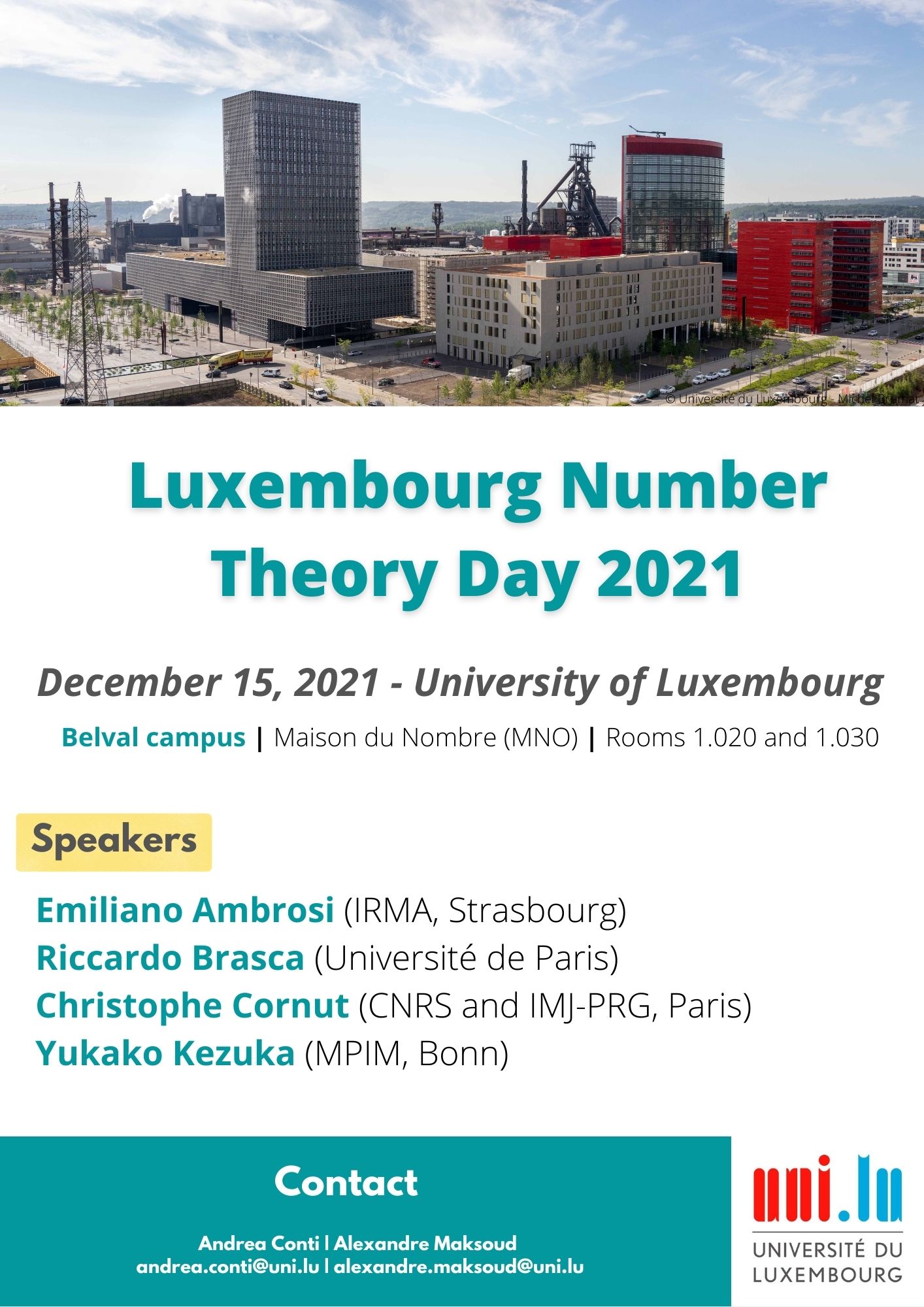

| Time | Room | Speaker | Title |
| 10:50-11:40 | MNO 1.030 | Riccardo Brasca | How to explain advanced mathematics to a computer |
| 11:40-12:00 | MNO 1.030 | Coffee break | |
| 12:00-12:50 | MNO 1.030 | Emiliano Ambrosi | Perfect points of abelian varieties |
| 12:50-14:00 | Lunch break | ||
| 14:00-14:50 | MNO 1.020 | Christophe Cornut | Harder-Narasimhan filtrations for Breuil-Kisin-Fargues modules |
| 14:50-15:10 | MNO 1.020 | Coffee break | |
| 15:10-16:00 | MNO 1.020 | Yukako Kezuka | On central L-values and the growth of the Tate-Shafarevich group |
Emiliano Ambrosi: Perfect points of abelian varieties
Let k be a function field over a finite field of characteristic p, A a k-abelian variety without isotrivial isogeny factors and k^{perf} the perfect closure of k. Motived by applications to the "full Mordell-Lang conjecture", we study the properties of A(k^{perf}). While A(k) is finitely generated by the Lang-Néron theorem, the structure of A(k^{perf}) is more complicated and mysterious. In this talk, after an introduction to the full Mordell-Lang conjecture and to the p-adic properties of A, we give a characterization of the abelian varieties such that A(k^{perf}) is finitely generated and we prove that, if the p-rank of A is >0 then the infinitely p-divisible elements in A(k^{perf}) are torsion.
Riccardo Brasca: How to explain advanced mathematics to a computer
Formalization is the process of explaining mathematics to a computer. In this talk, I will show how this is done using Lean, one of the several proof assistants available nowadays, and why I think this is important. I will speak about the "Liquid Tensor Experiment" project, whose goal is to formalize a recent theorem of Peter Scholze. In particular, this talk will not be about foundations of mathematics, and no prior knowledge about formalized mathematics is required to understand it.
Christophe Cornut: Harder-Narasimhan filtrations for Breuil-Kisin-Fargues modules
Shutkas with one paw have many incarnations, they play a central role in modern p-adic Hodge theory, and they encapsulate the "mystery" of Grothendieck's "mysterious" functor. In a joint work with Macarena Peche Irissarry, building on the work of Fargues on p-divisible groups, we tried to lift one of their many veils by exhibiting an implicit but hidden structure that they have: a Harder-Narasimhan filtration.
Yukako Kezuka: On central L-values and the growth of the Tate-Shafarevich group
I will study the family of elliptic curves C_N/Q of the form x^3+y^3=Nz^3 for any cube-free positive integer N. They are cubic twists of the Fermat elliptic curve x3+y3=z^3, and they admit complex multiplication by the ring of integers of the imaginary quadratic field Q(sqrt{-3}). First, I will establish a lower bound for the 3-adic valuation of the algebraic part of their central L-values in terms of the number of distinct prime divisors of N. I will then show that the bound is sometimes sharp, which gives us the 3-part of the conjecture of Birch and Swinnerton-Dyer for C_N/Q in certain special cases.